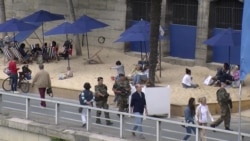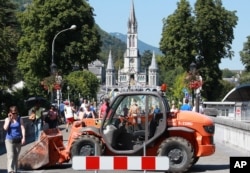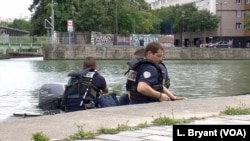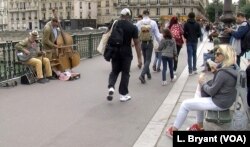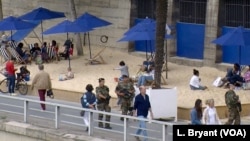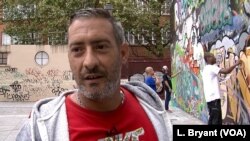Soldiers and police patrolling beaches and waterways. Catholic bishops searched at a major religious shrine. Fireworks, flea markets, concerts, and sports events cancelled or scaled down. Welcome to summer in France, where the state of emergency has been extended until early next year, after a pair of terrorist attacks last month.
One of the biggest security tests came this week, as thousands of Roman Catholics pilgrims packed the southwestern Pyrenees town of Lourdes to mark a major Assumption Day, in a site known for its miracles. Bomb squads and dog units were on hand, as the faithful attended services and processionals that took place just two weeks after an elderly priest was stabbed to death in Normandy.
“Nobody is spared, even the bishops are being searched,” Monsignor Nicolas Brouwet, the bishop of Lourdes told Le Monde newspaper.
On the Channel, French helicopters are air dropping gendarmes to patrol ferries crossing from Britain, and the government has beefed up the roughly 10,000 soldiers patrolling the country with thousands more reservists. Hundreds of events have been canceled around the country due to security concerns, including a major September flea market in the northern city of Lille.
Others are soldiering on, but without the usual summer insouciance. In Paris, sun worshippers lined up for bag checks before descending to the Paris-Plages, the annual spree of sand and palm trees taking place in two spots in the city. The summer outdoor film festival is also going ahead, only indoors for security reasons.
“The danger isn’t just in France, but everywhere, so we need to keep our heads, and our smiles,” said Parisian retiree Elisabeth Mouillet as she strolled by the Seine River with a friend. “So if there are fewer festivals this summer, well that’s just what is needed to handle today’s reality.”
The sense of "c’est la vie" (such is life) is being echoed by others around the capital, although many Parisians have fled to beaches and mountains for their annual August holidays.
French retiree Sophie Negre, on a day trip to Paris, opted to visit a little known hunting museum, where there would be fewer security hitches.
The stepped up vigilance is nothing new, she said; she lived in London during the Irish Republican Army bombings in the 1970s.
“We also had the shootings in the Rue de Rosier,” Negre added of attacks on this city’s Jewish quarter in 1982. “So here we are. Nothing new.”
To be sure, tourism has taken a hit after the wave of Islamist attacks in France during the past 19 months, including July’s truck assault in Nice that killed more than 80 people. Hotel occupancy rates in Paris and Nice have nosedived, restaurants in popular spots are half empty, and foreigners are canceling summer flights.
But a long line still snaked in front of Notre Dame Cathedral one recent afternoon. On a bridge nearby, lovers and friends paused to snap selfies framed by the Seine River and to listen to musicians play a Leonard Cohen ballad.
“I’ve got to enjoy Paris while I can,” said David, a teacher from Perth, Australia, who declined to give his last name. “I’m young enough to be out traveling and if I stayed home because there was some risk, I wold never go everywhere. I’ve got to go out and see the world.”
With so many events cancelled, others are making their own summer fun. Crowds of Pokemon Go enthusiasts converge each evening at La Villette, in northern Paris. At a canal nearby, others opt for the more traditional pastimes of boules and picnics.
Street art is also hot. Near the Place de la Republique, where waves of anti-terror demonstrators once gathered, artist Fred Morelli spent the day spraying painting a wall with friends, to the beat of hip-hop.
Their creations are swiftly covering up the ancient Paris motto, "Fluctuat Nec Mergitur" — Latin for "tossed but not sunk" — painted after last November's attacks.
“We need to get out,” he said. “We have to fight the terrorists by being present. If we hide, it means they’ve won.”




